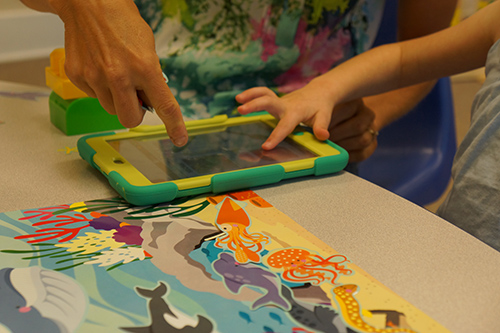
Elizabeth Lorah's research focuses on the use of technology to help children with autism, specifically to improve communication. One of Lorah's research articles is now being cited by a major insurance company.
Lorah is a University of Arkansas assistant professor of special education who is prepared as an applied behavior analyst on the doctoral level. She joined the faculty of the College of Education and Health Professions in 2013.
Aetna, an American managed health-care company, cited a paper that was published in 2014 by the Journal of Autism and Developmental Disorders with Lorah as first author. The article, "A Systematic Review of Tablet Computers and Portable Media Players as Speech Generating Devices for Individuals with Autism Spectrum Disorder," is cited by Aetna in its policy information about speech generating devices. The article was co-authored by Ashley Parnell, a U of A doctoral student in special education; Peggy Schaefer Whitby, an associate professor of special education who also an applied behavior analyst; and Donald Hantula, an associate professor of psychology at Temple University, where Lorah received her doctorate, master's degree and bachelor's degree.
The article found that off-the-shelf handheld devices such as tablet-based computers or portable multimedia players can be adapted to function as speech generating devices for people with autism or related developmental disabilities. It reviewed previous research done including some by Lorah, Parnell and Hantula. Studies comparing these devices to picture exchange systems or manual sign language found that learning was often quicker when using a tablet computer, and the vast majority of study participants preferred using the tablets.
"It is likely because the iPad is a highly sought-after consumer product with a game-like interface," Lorah said. "It looks good and is fun to use. We know that attractive and fun things tend to work better. An individual will be more motivated to use a device that is liked."
The article stated future research in interface design, user experience and extended verbal repertoires is recommended. Lorah and her colleagues are continuing to study these aspects and others to help people with autism communicate. They have published five follow-up articles since the piece cited by Aetna.
Contacts
Heidi Wells, director of communications
College of Education and Health Professions
479-575-3138,